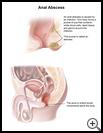
Anal Abscess
________________________________________________________________________
KEY POINTS
- An anal abscess is an infection on or near the anus, which is the opening of the rectum where bowel movements leave the body. The abscess may contain a pocket of pus.
- An anal abscess may be treated with antibiotic medicine and with surgery to open and drain the infected area.
- Follow your child’s healthcare provider's instructions about when your child can return to normal activities and how to take care of your child at home.
________________________________________________________________________
What is an anal abscess?
An anal abscess is caused by an infection on or near the anus, which is the opening of the rectum where bowel movements leave the body. The body forms a pocket of pus surrounding the infection called an abscess. Pus is a thick fluid that usually contains white blood cells, dead tissue, and germs.
What is the cause?
An anal abscess is usually caused by a bacterial infection in the area around the anus. An abscess is a pocket of pus in the deeper layers under the skin. An abscess happens when germs get into tissue below the outer layer of skin. Most of the time an abscess is caused by bacteria, but rarely, it can be caused by a virus or fungus.
Your child’s risk of having an anal abscess may be higher if your child has a long-term condition such as Crohn’s disease, ulcerative colitis, or diabetes.
What are the symptoms?
Symptoms may include:
- Redness with soreness near or around the anus
- Swelling or a lump near the anus
- Drainage or pus near the anus
- Pain in the anal or rectal area, especially when having a bowel movement
- Fever
How is it diagnosed?
Your child’s healthcare provider will ask about your child’s symptoms and medical history and examine your child. Tests may include:
- An exam of the area around and inside your child’s anus. Your child’s provider will put a lubricated and gloved finger gently into your child’s anus to try to feel a lump.
- Anoscopy, which uses a small, lighted tube put into your child’s anus to examine the anal area
- Ultrasound, which uses sound waves to show pictures of the anal area
Your child may have tests to see if there is a related problem such as an anal fistula. An anal fistula is an abnormal tunnel between the rectum and the outer skin of the anus. A fistula sometimes happens after your child has an abscess in the anus or rectum.
How is it treated?
Your child’s provider may prescribe antibiotic medicine. An anal abscess may need to be treated with surgery to open and drain the infected area.
- Small abscesses may be treated in your child’s healthcare provider's office.
- If the abscess is large, your child may need surgery in a hospital or surgery center.
- If your child has a condition that makes it hard to heal, such as diabetes or cancer, your child may need to stay in the hospital.
How can I take care of my child?
To care for your child at home after treatment:
- Help keep your child’s bowel movements soft by:
- Following your child’s healthcare provider's instructions for taking stool-softening medicines
- Helping your child drink plenty of water
- After bowel movements, help your child gently wipe the area around the anus with clean, moist pads. This will remove irritating particles and fluid from the anal area.
- Have your child soak in warm baths 2 to 3 times a day to help relieve pain and keep the area clean. Warm baths help bring more blood flow to the area. Blood brings infection-fighting cells and healing nutrients.
Follow your child’s healthcare provider's instructions. Ask your child’s provider:
- How and when you will get your child’s test results
- How long it will take to recover
- If there are activities you child should avoid and when your child can return to normal activities
- How to take care of your child at home
- What symptoms or problems you should watch for and what to do if your child has them
Make sure you know when your child should come back for a checkup. Keep all appointments for provider visits or tests.
How can I help my child prevent an anal abscess?
There is no sure way to prevent anal abscesses. You may be able to help prevent them if you help your child:
- Get treatment for any rectal problems, especially infections or pain, right away.
- For an older child, advise your teen to avoid sexual contact with others until your teen’s provider says it’s OK. Teach an older teenager to practice safe sex. Teach your teenager to use latex or polyurethane condoms the right way during foreplay and every time he or she has vaginal, oral, or anal sex, and to have just 1 sexual partner who is not sexually active with anyone else and who will use protection every time your teen has sex.
- If your child has diabetes, help your child keep his or her blood glucose (sugar) level under control.
Follow your child’s healthcare provider’s advice for taking care of any long-term health conditions.
Last modified: 2020-11-02
Last reviewed: 2018-03-27

